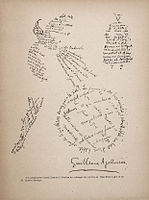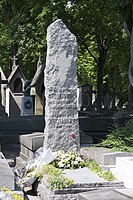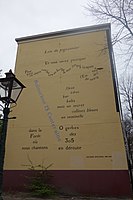Guillaume Apollinaire
French poet (1880–1918) From Wikipedia, the free encyclopedia
Guillaume Apollinaire (French: [ɡijom apɔlinɛʁ], born Kostrowicki[a]; 26 August 1880 – 9 November 1918) was a French poet, playwright, short story writer, novelist, and art critic. He had Polish ancestry.
Guillaume Apollinaire | |
|---|---|
 Photograph of Guillaume Apollinaire in spring 1916 after a shrapnel wound to his temple | |
| Born | Wilhelm Albert Włodzimierz Apolinary Kostrowicki 26 August 1880 Rome, Italy |
| Died | 9 November 1918 (aged 38) Paris, France |
| Resting place | Père Lachaise Cemetery, Paris |
| Occupation |
|
| Literary movement | Cubism, Surrealism, Orphism |
| Signature | |

Apollinaire is one of the most important poets of the early 20th century. He defended Cubism and helped start Surrealism. He invented the words "Cubism"[1] in 1911, "Orphism" in 1912, and "Surrealism" in 1917.[2] Apollinaire wrote many early Surrealist works. One of these was the play The Breasts of Tiresias (1917). This play became the basis for Francis Poulenc's 1947 opera Les mamelles de Tirésias.
When Guillaume was young, he was influenced by Symbolist poetry. During his life, he was admired by the young poets who helped influence Surrealism. He was very original, and his work was not based on any theory.
Apollinaire was also a journalist and art critic for Le Matin, L'Intransigeant, L'Esprit nouveau, Mercure de France, and Paris Journal. In 1912, Apollinaire cofounded Les Soirées de Paris, an artistic and literary magazine.
Apollinaire was wounded in World War I. During the pandemic of 1918, Apollinaire died of the Spanish flu.[3]
Works
- A Calligramme by Guillaume Apollinaire[4]
- Apollinaire's grave in Père Lachaise Cemetery
- Poem by Apollinaire on a wall in Leiden
Poetry
- L'enchanteur pourrissant (1909). The Enchanter Rotting
- Le Bestiaire ou Cortège d'Orphée (1911)
- Alcools (1913)
- Vitam impendere amori (1917)
- Calligrammes, poèmes de la paix et de la guerre 1913–1916 (1918) (published shortly after Apollinaire's death)
- Il y a... (1925) Albert Messein
- Julie ou la rose (1927)
- Ombre de mon amour (1947). Poems addressed to Louise de Coligny-Châtillon
- Poèmes secrets à Madeleine (1949). Pirated edition
- Le Guetteur mélancolique (1952). Previously unpublished works
- Poèmes à Lou (1955)
- Soldes (1985). Previously unpublished works
- Et moi aussi je suis peintre (2006). Album of drawings for Calligrammes, from a private collection
Novels
- Mirely ou le Petit Trou pas cher (1900). Mirely, or The Cheap Little Hole (unpublished)
- Que faire ? (1900). What to Do?
- Les Onze Mille Verges ou les Amours d'un hospodar (1907). The Eleven Thousand Rods; The Debauched Hospodar
- Les Exploits d'un jeune Don Juan (1911). The Amorous Exploits of a Young Rakehell, trans. Reaves Tessor (1959)
- La Rome des Borgia (1914). The Rome of the Borgias
- La Fin de Babylone (1914). The Fall of Babylon
- Les Trois Don Juan (1915). The Three Don Juans
- La Femme assise (1920). The Sitting Woman
Short story collections
- L'Hérèsiarque et Cie (1910). The Heresiarch and Co., trans. Rémy Inglis Hall (1965)[5]
- Le Poète assassiné (1916). The Poet Assassinated, trans. Matthew Josephson (1923, title story);[6] trans. Ron Padgett (1968, unabridged)[7]
- Les Épingles (1928). The Pins
Plays
- Les Mamelles de Tirésias (1917). The Breasts of Tiresias
- La Bréhatine (1917). Screenplay (collaboration with André Billy)
- Couleurs du temps (1918)
- Casanova (published 1952)
Articles
- Le Théâtre italien, illustrated encyclopedia, 1910
- Preface, Catalogue of 8th Salon annuel du Cercle d'art Les Indépendants, Musée moderne de Bruxelles, 10 June – 3 July 1911.
- La Vie anecdotique, Chroniques dans Le Mercure de France, 1911–1918
- Pages d'histoire, chronique des grands siècles de France, chronicles, 1912
- Les Peintres Cubistes, Méditations Esthétiques, 1913
- La Peinture moderne, 1913
- L'Antitradition futuriste, manifeste synthèse, 1913
- Jean Metzinger à la Galerie Weill, Chroniques d'art de Guillaume Apollinaire, L'Intransigeant, Paris Journal, 27 May 1914
- Case d'Armons, 1915
- L'esprit nouveau et les poètes, 1918
- Le Flâneur des Deux Rives, chronicles, 1918
Translations into English
- The Poet Assassinated, trans. Matthew Josephson (The Broom Publishing, 1923)
- Selected Writings, trans. Roger Shattuck (New Directions, 1948)
- Alcools: Poems 1898–1913, trans. Walter Meredith (Doubleday, 1964)
- Alcools, trans. Anne Hyde Greet (University of California Press, 1965)
- Selected Poems, trans. Oliver Bernard (Penguin, 1965; expanded, bilingual edition, Anvil Press, 1986)
- The Heresiarch and Co., trans. Rémy Inglis Hall (1965), published in the UK as The Wandering Jew and Other Stories (1967)[8]
- The Poet Assassinated, trans. Ron Padgett (Holt, Rinehart & Winston, 1968)
- Calligrams, trans. Anne Hyde Greet (Unicorn Press, 1970)[9]
- Apollinaire on Art: Essays and Reviews, 1902-1918, trans. Susan Suleiman (1972)
- Zone, trans. Samuel Beckett (Dolmen Press, 1972)
- Alcools: Poems, trans. Donald Revell (Wesleyan University Press, 1995)
- The Self-Dismembered Man: Selected Later Poems, trans. Donald Revell (Wesleyan University Press, 2004)
- The Little Auto, trans. Beverley Bie Brahic (CB editions, 2012)
- "Zone", trans. David Lehman, in Virginia Quarterly Review (2013)[10]
- Zone: Selected Poems, trans. Ron Padgett (New York Review Books, 2015)
- Selected Poems, trans. Martin Sorrell (Oxford University Press, 2015)
In popular culture
- French composer Francis Poulenc has set Apollinaire's poems to music in his five-part song cycle Banalités (1940), which in turned inspired Pink Martini's song Sympathique (je ne veux pas travailler in 1997.
- Dutch composer Marjo Tal set some of Apollinaire’s poetry to music.[11]
- French composer Denise Roger set Apollinaire’s poetry to music.[12]
- Apollinaire is played by Seth Gabel in the 2018 television series Genius, which focuses on the life and work of Pablo Picasso.
See also
- La Chanson du mal-aimé, oratorio by Léo Ferré on Apollinaire's eponymous poem (from Alcools)
- Monostich
- Prix Guillaume Apollinaire
Notes
- His full birth name in Polish is Wilhelm-Albert-Włodzimierz-Aleksander-Apolinary Kostrowicki (Belarusian: Гіём-Альберт-Уладзімір-Аляксандр-Апалінарый Кастравіцкі) of the Wąż coat of arms.
References and sources
Other websites
Wikiwand - on
Seamless Wikipedia browsing. On steroids.




